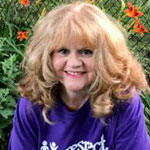Message from Dr. Newman: Healthy Relationships
 Someone recently asked me about the RESPECT mission statement – “Building Healthy Relationships” – “What does that mean exactly?” “Is it that important for kids to have healthy relationships? Aren’t relationships really more of an adult thing?” This is what we think at RESPECT.
Someone recently asked me about the RESPECT mission statement – “Building Healthy Relationships” – “What does that mean exactly?” “Is it that important for kids to have healthy relationships? Aren’t relationships really more of an adult thing?” This is what we think at RESPECT.
Relationships with others start at birth, with the very first interactions between parents/caretakers and children. They vary developmentally and over time, there are individual differences, but they are present and very important.
At RESPECT we want children and youth to have relationships that are positive, safe, and healthy – this is important so that kids can be happy and productive, as children and as they grow into adult relationships.
In positive relationships interactions do not lead to fear, shame, or exclusion. Positive relationships are characterized by learning from and supporting one another.
In safe relationships, physical and emotional boundaries are identified, communicated, and respected. Interactions are not characterized by abuse, violence, bullying, or inappropriate uses of power and control. Safe relationships are characterized by being able to share ideas, perspective and who you are with confidence and pride.
In healthy relationships, kids can spend time on their own and with others, doing social activities, schoolwork, chores – mostly uninterrupted by big emotions such as sadness, anger, worry, or fear. Healthy relationships reflect skills that are correlated with learning, creativity, productivity, being able to cope, problem solve and reach out for help when needed.
Relationships occur between people and healthy relationships allow for respect and empathy among people who are different from each other. People treat people the way they like to be treated and refrain from doing things to others that they don’t want done to them. People can be assertive without being aggressive. They can “agree to disagree.” They understand that it is acceptable to not know an answer or to be wrong. They can benefit and learn from peers who may seem to have little in common with them. They can accept others who live and see the world differently than they do while remaining steadfast to their own identity.
Fortunately for RESPECT’s mission to “Build Healthy Relationships?” The information, skills and resources that youth need to have positive, safe and healthy relationships can be taught using educational theatre and a wide variety of teaching methods based in theatre including games, artist in residence programs, improvisation, role play and more!
Healthier relationships for adults ARE important, but they begin with kids who are positive, safe and healthy in their childhood relationships with others.
RESPECTfully,
Patricia
